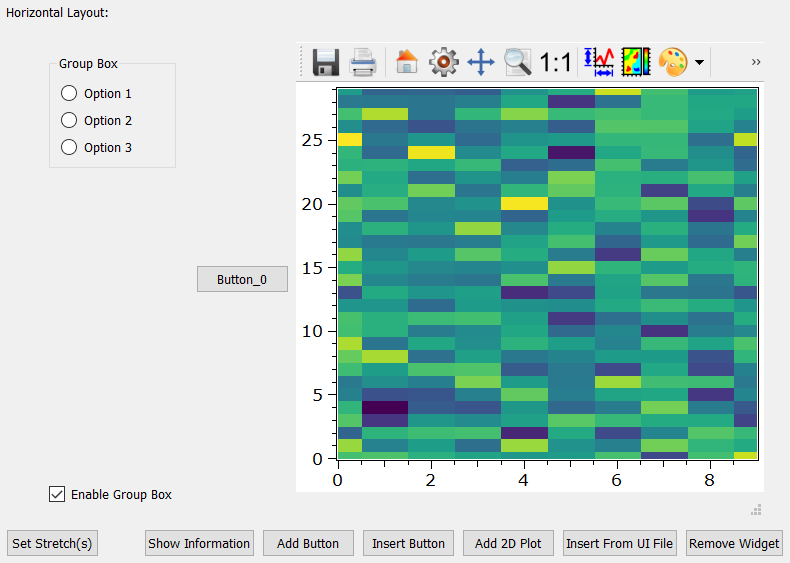Note
Go to the end to download the full example code.
12.1.10.10.5. Multiple plots in horizontal layout#
Example for dynamically changing the content of a form layout.
from itomUi import (
ItomUi,
) # import the base class ItomUi from the module itomUi in the itom-packages subfolder
from itom import ui
from itom import uiItem
from itom import dataObject
class MultiPlotHorLayout(ItomUi):
def __init__(self): # constructor
# call constructor of ItomUi like it would be the constructor of the class itom.ui:
ItomUi.__init__(self, "multiplePlotsInHorizontalLayout.ui", ui.TYPEWINDOW)
# the spacing between each item of the layout is a property
self.layout["spacing"] = 7
# contents margins is left, top, right, bottom
self.layout.call("setContentsMargins", 30, 15, 20, 5)
@property
def layout(self):
"""The reference to the horizontal layout."""
return self.gui.horLayout
@property
def numWidgets(self):
"""Returns number of widgets in horLayout."""
return self.layout.call("count")
@ItomUi.autoslot("")
def on_btnInfo_clicked(self):
text = f"Num plots: {self.numWidgets}"
for idx in range(self.numWidgets):
widget: uiItem = self.layout.call("itemAt", idx)
stretch: int = self.layout.call("stretch", idx)
text += f"\nWidget {idx+1}: {str(widget)}, stretch: {stretch}"
ui.msgInformation("Information", text, parent=self.gui)
@ItomUi.autoslot("")
def on_btnAddButton_clicked(self):
className = "QPushButton"
objectName = f"Button_{self.numWidgets}"
obj: uiItem = self.layout.call("addItem", className, objectName)
obj["text"] = objectName
obj.connect("clicked()", self._buttonClicked)
self.gui.btnRemove["enabled"] = self.numWidgets > 0
self.gui.btnSetStretch["enabled"] = self.numWidgets > 0
@ItomUi.autoslot("")
def on_btnAddPlot_clicked(self):
className = "itom2dqwtplot"
objectName = f"Plot_{self.numWidgets}"
obj: uiItem = self.layout.call("addItem", className, objectName)
obj["source"] = dataObject.randN([30, 10])
self.gui.btnRemove["enabled"] = self.numWidgets > 0
self.gui.btnSetStretch["enabled"] = self.numWidgets > 0
@ItomUi.autoslot("")
def on_btnInsertButton_clicked(self):
idx, valid = ui.getInt(
"Position",
"At which index should the button be inserted (-1: end)?",
0,
parent=self.gui,
)
if valid:
className = "QPushButton"
objectName = f"Button_{self.numWidgets}"
obj: uiItem = self.layout.call("insertItem", idx, className, objectName)
obj["text"] = objectName
obj.connect("clicked()", self._buttonClicked)
self.gui.btnRemove["enabled"] = self.numWidgets > 0
self.gui.btnSetStretch["enabled"] = self.numWidgets > 0
@ItomUi.autoslot("")
def on_btnInsertFromUiFile_clicked(self):
idx, valid = ui.getInt(
"Position",
"At which index should the widget from the UI file 'container.ui' be inserted (-1: end)?",
0,
parent=self.gui,
)
if valid:
obj: uiItem = self.layout.call(
"insertItemFromUiFile",
idx, # index
"container.ui", # filename to ui file
"_%i"
% self.numWidgets, # prefix, added to the objectNames of all new widgets and layouts
)
self.gui.btnRemove["enabled"] = self.numWidgets > 0
self.gui.btnSetStretch["enabled"] = self.numWidgets > 0
@ItomUi.autoslot("")
def on_btnRemove_clicked(self):
if self.numWidgets <= 0:
return
labels = [
self.layout.call("itemAt", idx)["objectName"]
for idx in range(self.numWidgets)
]
name, valid = ui.getItem(
"Widget to remove",
"Select the widget to be removed",
labels,
editable=False,
)
if valid:
idx = labels.index(name)
self.layout.call("removeItemAt", idx)
self.gui.btnRemove["enabled"] = self.numWidgets > 0
self.gui.btnSetStretch["enabled"] = self.numWidgets > 0
@ItomUi.autoslot("")
def on_btnSetStretch_clicked(self):
if self.numWidgets <= 0:
return
stretchs = [
str(self.layout.call("stretch", idx)) for idx in range(self.numWidgets)
]
text, valid = ui.getText(
"Stretch",
f"Indicate a comma-separated list of stretch "
f"factors for up to {self.numWidgets} widgets",
",".join(stretchs),
)
if valid:
stretchs = text.split(",")
if len(stretchs) > self.numWidgets:
ui.msgCritical(
"Wrong input",
f"Stretchs must be a comma separated list of "
f"integers (max. {self.numWidgets} entries)",
parent=self.gui,
)
return
for idx in range(len(stretchs)):
try:
val = int(stretchs[idx])
except ValueError:
ui.msgCiritcal(
"Wrong input",
f"Value '{stretchs[idx]}' is no integer number",
parent=self.gui,
)
return
self.layout.call("setStretch", idx, val)
def _buttonClicked(self):
# slot, called if any button is clicked
ui.msgInformation(
"Button clicked", "The button has been clicked", parent=self.gui
)
# create a first instance of AutoConnectExample and the gui
win1 = MultiPlotHorLayout()
win1.gui.show() # show the gui

Total running time of the script: (0 minutes 0.038 seconds)
